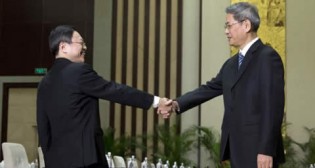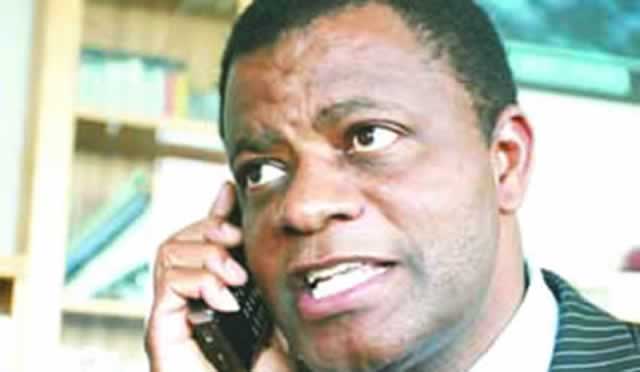China, Taiwan hold historic talks


Zhang Zhijun, head of the State Council Taiwan Affairs Office (SCTAO), held a formal meeting with Wang Yu-chi, Taiwan’s mainland affairs chief
NANJING/TAIPEI. – Chiefs of cross-Strait affairs from the Chinese mainland and Taiwan met formally for the first time yesterday since 1949. Zhang Zhijun, head of the State Council Taiwan Affairs Office (SCTAO), held a formal meeting with Wang Yu-chi, Taiwan’s mainland affairs chief, who arrived in Nanjing, capital of east China’s Jiangsu Province, yesterday as part of a four-day visit.
At their meeting, the two agreed to open a regular communication channels between their departments, the result of deepening mutual political trust on the basis of the 1992 consensus, said Zhang.
“I believe, with this arrangement, we will improve exchanges, understanding and mutual trust, and better handle outstanding problems in cross-Strait exchanges,” he said.
When explaining the mechanism, Wang told a Press conference after the meeting that senior officials of the two departments could “just pick up their mobile phones and talk” instead of setting up a special hot line.
Zhang also accepted Wang’s invitation to visit Taiwan.
The mechanism will not replace talks between the mainland Association for Relations Across the Taiwan Straits (ARATS) and its Taiwan counterpart the Straits Exchange Foundation (SEF), which focus on detailed affairs and cross-Strait agreements. Nor will not change the way other departments contact each other.
Zhang Nianchi, director of the Shanghai Institute for East Asian Studies, told Xinhua that the arrangement is in line with the One China principle and will play a different role from the ARATS-SEF talks.
“They will not collide with each other. The cross-Strait affairs departments talk about bigger and more general topics,” Zhang said. “At this meeting, they will talk about the most urgent cross-Strait issues.”
Liu Xiangping, deputy head of the Institute of Taiwan Studies at Nanjing University, said that the new arrangement should help the ARATS-SEF talks be more effective.
Wu-ueh Chang, professor with the graduate institute of China studies at Taiwan’s Tamkang University, told Xinhua that it was a good prelude to tackling political issues and perhaps to meetings between senior leaders.
“We can not expect too many achievements in one night. They will have to work harder on many issues,” he said.
In his speech at the meeting, Wang described his meeting with Zhang as “an unimaginable occasion in earlier years”.
“Being able to sit down and talk is really valuable, considering that the two sides were once almost at war,” he said in the address.
Zhang agreed that such a meeting would have been impossible earlier and called for “a little more imagination” in cross-Strait relations.
Relations between the mainland and Taiwan stalled when the Kuomintang, led by Chiang Kai-shek, fled to Taiwan in 1949 after being defeated in a civil war.
Business and personnel exchanges resumed in the late 1980s, and in the early 1990s the two sides started to engage with each other through the mainland-based Association for Relations Across the Taiwan Straits, and its Taiwan counterpart, the Straits Exchange Foundation.
The meeting between Zhang and Wang is an important breakthrough and may lead to regular visits. The two first met informally on the sidelines of the economic leaders’ meeting of the Asia-Pacific Economic Co-operation in Bali, Indonesia last October, when they agreed to mutual visits.
Professor Su Chia-hung of Taiwan’s Fooyin University told Xinhua that the meeting is good for Taiwan and will lead to closer economic and cultural co-operation.
“If such meetings produce concrete outcomes and better services for common people, Taiwan will welcome the arrangement,” he said. – Xinhua.









Comments